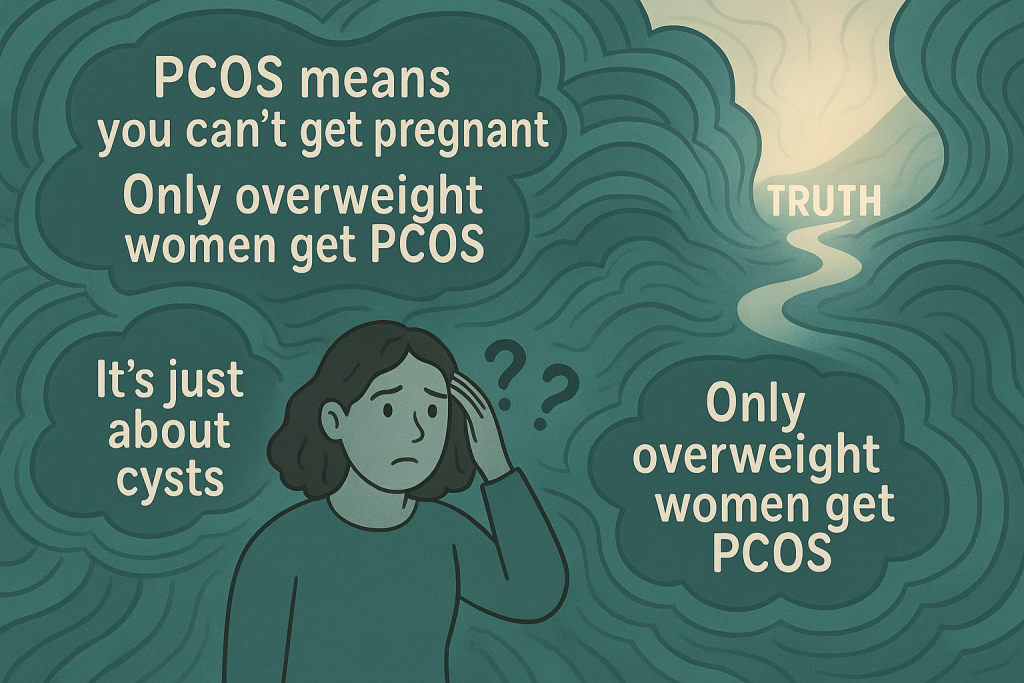Understanding PCOS: Why Busting Myths Matters

Polycystic Ovary Syndrome (PCOS) is one of the most common hormonal disorders affecting women and people with ovaries worldwide. Yet, despite its prevalence, PCOS remains shrouded in misconceptions, half-truths, and outright myths. These misunderstandings can be more than just frustrating—they can delay diagnosis, hinder effective treatment, and contribute to unnecessary stigma and isolation.
In this introductory article to our “Myths vs Facts about PCOS” series, we’ll explore what PCOS is, why myths persist, and why it’s so important to separate fact from fiction.
What Is PCOS?
PCOS is a complex endocrine disorder that affects an estimated 8–13% of women of reproductive age globally (Teede et al., 2018, Nature Reviews Disease Primers). It is characterized by a combination of symptoms, which may include:
-
Irregular or absent menstrual cycles
-
Excess androgen (male hormone) levels, leading to symptoms like acne or excess hair growth
-
Polycystic ovaries visible on ultrasound
However, not everyone with PCOS will have all these symptoms, and the condition can manifest in a variety of ways.
Why Are There So Many Myths About PCOS?

The diversity of PCOS symptoms, the evolving nature of its diagnosis, and the lack of universal awareness contribute to widespread misinformation. Myths can arise from:
Outdated medical advice
Anecdotal experiences shared online
Misunderstandings about hormones and reproductive health
Cultural beliefs and stigma around women’s health
These myths can have real consequences, from delayed diagnosis to ineffective management and emotional distress.
The Power of Busting Myths
Busting PCOS myths isn’t just about setting the record straight. It’s about empowering individuals with accurate information so they can:
Seek timely and appropriate care
Advocate for themselves in medical settings
Make informed decisions about their health and lifestyle
Connect with supportive communities
As a hormonal harmony advocate and community leader, I’ve seen firsthand how knowledge can transform lives. When we replace myths with facts, we open the door to better health, self-acceptance, and hope.
When I first started advocating for hormonal wellness, I was struck by how many people felt alone and misunderstood because of the myths surrounding PCOS. I’ve spoken to women who were told their symptoms were “just stress,” or that they “just needed to lose weight.” The relief and empowerment that comes from finally understanding the truth about PCOS is profound—and that’s why this series exists.
Key Takeaway
PCOS is a complex, multifaceted condition that can’t be reduced to a single symptom or stereotype. Dispelling myths is the first step toward better health, stronger self-advocacy, and a more supportive community. In the coming articles, we’ll tackle the most common PCOS myths—one by one—armed with science, empathy, and hope.
Next Up:
“Myth: PCOS Means You Can’t Get Pregnant”—stay tuned as we separate fact from fiction and empower you with the knowledge you deserve.
References
-
Teede, H. J., Misso, M. L., Costello, M. F., et al. (2018). “Recommendations from the international evidence-based guideline for the assessment and management of polycystic ovary syndrome.” Nature Reviews Disease Primers, 4, 18042. Read the study
You are not alone
Do you have questions? Want to learn from others also on their hormonal health journey? We have the answers in our Hormonal Harmony Hub (H3) community.
